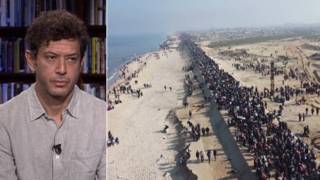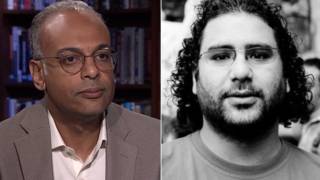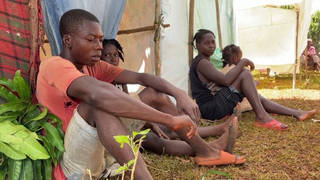
Related
Guests
- Dr. Evan Lyonphysician with the group Partners in Health who has spent years working in Haiti.
The Haitian government says a cholera outbreak is slowing down, but experts are warning the disease could remain for many years. At least 259 people have died, and over 3,300 have been infected. We speak with Dr. Evan Lyon, a physician with the group Partners in Health who has spent years working in Haiti. In 2008, he helped lead a study on how the US undermined clean water projects in Haiti. [includes rush transcript]
Transcript
AMY GOODMAN: We’re going to turn now to another top story of the day. The Haitian government says a cholera outbreak is slowing down, but experts are warning the disease could remain for many years. At least 259 people have died. Over 3,300 have been infected. But the numbers could be far higher, because some remote areas haven’t been counted and the disease is generally symptomless in 75 percent of cases. Most of the deaths have occurred in the rural Artibonite region, but at least five cases have been confirmed in the capital Port-au-Prince. Authorities have established treatment centers in Port-Au-Prince, where over a million Haitians have lived in camps following the January earthquake.
On Monday, the Haitian government said the outbreak appears to have been contained, with just six new deaths since Sunday, compared to 220 late last week. But the deputy director of the Pan American Health Organization, Dr. Jon Arbus, said Haiti could be dealing with cholera for years to come.
DR. JON ARBUS: Cholera has established itself with a strong foothold in Haiti. It’s probably clear to us that this will not go away for several years. We’ll need to — this front-full surge of cases will come down, but there will probably be sporadic cases in the future, now that the bacteria is well established in the environment.
AMY GOODMAN: Cholera is easily spread through contaminated drinking water and poor sanitation, major issues for a country devastated by the January earthquake. But there’s a political dimension to the cholera outbreak. Just as the earthquake’s impact was worsened by US trade policies that undermined Haitian self-sufficiency and forced thousands of Haitians to abandon rural areas for the teeming neighborhoods of Port-au-Prince, the cholera outbreak is renewing focus on the denial of key loans to Haiti nearly a decade ago. In an effort to destabilize then-President Jean-Bertrand Aristide, the Bush administration blocked millions of dollars in international loans. Key water projects were canceled or stalled, including some in the region where the cholera outbreak occurred.
For more, we’re joined right now by Dr. Evan Lyon in Chicago, physician with the group Partners in Health who’s spent years working in Haiti. In 2008, he helped lead a study on how the US undermined clean water projects in Haiti, the report dealing with the denial of the right to water in Haiti.
Evan, thank you very much for being with us. Describe this cholera outbreak, Dr. Lyon. We’re talking about a disease that is both treatable and preventable. How is it that so many thousand people are now infected?
DR. EVAN LYON: Thank you, Amy.
To describe the disease is pretty difficult. It’s a terrifying — it’s a terrifying situation. The economic and social conditions in Haiti have left Haitians vulnerable to any manner of infectious diseases that are endemic there — typhoid, TB, malaria, HIV. But this is new. There hasn’t been cholera in Haiti for more than fifty years, so the population has little experience with it. It’s a very fast-moving disease. Often, from the first onset of symptoms, someone will die of dehydration, if they’re not given help within twenty-four hours. For the young, for the old, for vulnerable people, that’s often within twelve hours. So this is a very fast-moving disease. In a population where at least 70 percent of people have no access to improved water or sanitation, people cannot protect themselves. So the country is terrified at this point. So the people have no experience with this disease. Their immune systems have no exposure, which will help the disease spread more rapidly. And then, of course, nurses and doctors also have not seen this disease in several generations. So it’s a terrifying situation, rooted, as you introduced, in the lack of infrastructure, lack of sanitation and clean water, which has been very clearly — very clearly slowed down and diminished by manipulation from the outside.
AMY GOODMAN: And very quickly, we know it’s in the Artibonite region, which is considered the breadbasket of Haiti. You’ve also found it in a prison.
DR. EVAN LYON: Yeah, that’s right. This epidemic first came to light about a week ago with the first cases and then was confirmed a day or so later, and then it exploded. About fifty or sixty miles upriver from Saint-Marc, where the epidemic has been most dense, there’s a prison in a town called Mirebalais, where I’ve worked for a number of years providing healthcare and trying to increase legal access. Inside that prison, to the best of my knowledge from talking to folks on the ground yesterday, there have been six deaths, and we now have twenty-five inmates who are inpatients with us at a center called La Colline, just up the road there. These prisoners obviously don’t leave the prison. The infection was brought to them by the water that’s around them. And the number of deaths and number of infections is really extraordinary. We understand that somewhere beneath — somewhere below a quarter of people who are exposed and inoculated with the Vibrio cholerae germ become sick. So, in this prison of about 250 prisoners, there are now thirty documented cases of sickness and death. Everyone was exposed. Every single person in that prison was exposed to the germ. A good number became sick. They’re malnourished. They’re in horrible sanitation conditions. There’s very little access to water or food inside the prisons.
The other really remarkable and sad fact about this is that 80 percent of those inmates are not convicted of any crime. They’re awaiting — they’re awaiting trial. So, people who are in the prison based on accusations, but not yet in front of a judge, have now been handed a death sentence. The prisoners are still packed in the same crowded conditions, they’re going to be receiving the same water, and this epidemic is not going away. Again, like your introduction, I think a really salient feature and something that people need to remember is that cholera will not go away in Haiti until the underlying conditions that make people vulnerable are changed. This is another — this is another disease that Haiti will now have to manage, and many people will die, not just now. Maybe this first wave of epidemic is passing, but more important, this disease will be around as long as there’s poor infrastructure. With the population shifts that have happened since the earthquake and diminishing health resources throughout the country, it’s a very frightening time for the country.
AMY GOODMAN: And the loans denied by the Bush administration, in 2001 the Inter-American Development Bank loans, talk about how that contributes, what you see, as the problem today. Very quickly, Dr. Lyon?
DR. EVAN LYON: Sure. The Inter-American Development Bank recognized that water systems were vulnerable in 1997, approved loans around $54 million in 1998 to come to Haiti to improve water systems because of the recognition of how important this is to maintaining public health. In 2000, 2001, based on political considerations, trying to pressure the Haitian government to proceed with some electoral changes, the American — the US Treasury Department, which has a majority voting stake in the IDB, pressured the IDB to slow down loan disbursement. We uncovered this in a report that Partners in Health, Zanmi Lasante, the RFK Foundation in New York and the Center for Human Rights and Global Justice at NYU published to reveal that for political reasons these humanitarian loans were slowed down.
Ultimately, at this point, we know that the first water systems in Port-de-Paix in the north, where we did our study, and in Les Cayes in the south, those systems have not been improved in any substantial way, despite the fact that loans have been disbursed. Saint-Marc was on the list for a second wave of IDB loans for water improvement, but nothing has been done to date. So we have a direct line to — showing a recognition that water systems are vulnerable, the need for loans to come out to repair these life-saving infrastructures, and then a slowdown, a decade-long slowdown, which has a tremendous effect on the population at large. And now, in this period after the earthquake, when people are moving out of the city into the countryside, where health resources are scattered and less available, it’s made the population vulnerable. And I think it’s reasonable to draw a straight line from these loans being slowed down and cut off to the epidemic that emerged a week ago.
AMY GOODMAN: Dr. Evan Lyon, I want to thank you for being with us. We will continue to follow what’s happening in Haiti with cholera ripping through certain areas. Dr. Evan Lyon is a physician who’s worked in Haiti with the group Partners in Health for years.












Media Options